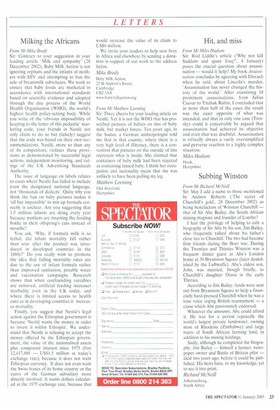Milking the Africans
From Mr Mike Brady Sir: Contrary to your suggestion in your leading article 'Milk and sympathy' (28 December 2002), Baby Milk Action is not ignoring orphans and the infants of mothers with HIV and attempting to ban the sale of breastmilk substitutes. We work to ensure that baby foods are marketed in accordance with international standards based on scientific evidence and adopted through the due process of the World Health Organisation (WHO), the world's highest health policy-setting body. While you write of the 'obvious impossibility of keeping to the letter of this pedantic' marketing code, your friends in Nestle not only claim to do so but (falsely) suggest that the code was based on their own recommendations. Nestle, more so than any of its competitors, violates these provisions as demonstrated by successful legal actions, independent monitoring, and rulings of the UK Advertising Standards Authority.
The issue of language on labels relates to cases where Nestle" has failed to include even the designated national language, not 'thousands of dialects'. Quite why you think the ban on baby pictures makes it 'all but impossible' to mix up formula correctly is unclear. Are you suggesting that 1.5 million infants are dying every year because mothers are inserting the feeding bottle in their offspring's ears instead of mouths?
You ask, 'Why, if formula milk is so lethal, did infant mortality fall rather than soar after the product was introduced in developed countries in the 1860s?' Do you really wish to promote the idea that falling mortality rates are due to the use of infant formula rather than improved sanitation, potable water and vaccination campaigns. Research shows that when confounding variables are removed, artificial feeding increases morbidity even in the UK today, and where there is limited access to health care as in developing countries it increases mortality.
Finally, you suggest that Nestle's legal action against the Ethiopian government is because 'Nestle wants the money in order to invest it within Ethiopia'. We understand that Nestle is refusing to accept the money offered by the Ethiopian government, the value of the nationalised assets plus compound interest since 1975 (birr 12,417,888 — US$1.5 million at today's exchange rate), because it does not want Ethiopian currency. It does not even want the Swiss francs of its home country or the cures of the German subsidiary more directly involved. It wants dollars calculated at the 1975 exchange rate, because that would increase the value of its claim to US$6 million.
We invite your readers to help save lives in Africa and elsewhere by sending a donation in support of our work to the address below.
Mike Brady
Baby Milk Action,
23 St Andrew's Street, Cambridge
CB2 3AX www.babymilkaction.org


























































 Previous page
Previous page